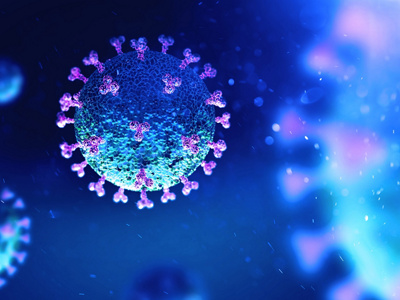Covid-19 (often just called “Coronavirus” or “Covid” in ordinary conversation) is an illness with a wide, non-specific range of symptoms. It is caused by the SARS-CoV-2 coronavirus. It spreads very rapidly to all corners of the world and is the cause of the Covid-19 pandemic. By November 2021 it is thought that over 250 million people have been infected and that more than 5 million people have died from the virus (plus very many more unrecorded cases). The result is a very severe strain on the healthcare system. Options for prevention and treatment are therefore the centre of attention.
Cause
Covid-19 is caused by an infection from the SARS-CoV-2 coronavirus that was first identified in China in 2019 as the cause of what can be a severe respiratory tract infection. By analogy with a coronavirus that made an earlier appearance, the virus was named SARS-CoV-2 (severe acute respiratory syndrome coronavirus type 2).
The origin of the virus has not been definitively determined. The supposition is that the virus was transmitted from animals to humans.
Infection
Infection is primarily via the respiratory tract through the airborne transmission of liquid droplets containing the virus and originating from breathing, coughing, sneezing, speaking or singing (often called “aerosol and droplet infection”). In indoor rooms and spaces aerosols (particles with a diameter of approximately 0.001 to 5 micrometres) can also remain in the air and spread over long distances. Aerosols are less relevant for infections in the open air. Transmission of viral particles on surfaces and introduced into the oral and nasal cavities via the hands is also possible. However, contact transmission is less likely than aerosol or droplet infection.
Symptoms and course of the disease
The course of the disease and the symptoms can vary greatly. The assumption is that approximately 20-40% of infected persons have no symptoms or only the very mild symptoms of a cold.
The symptoms of a Covid illness generally appear 3-6 days after infection. Initial signs often take the form of mild symptoms such as a headache and sore throat. Typically, coughing and a high temperature follow. A loss of taste and smell can also occur and are characteristic features distinguishing Covid-19 from influenza or a cold. Congestion and sneezing are frequent symptoms of a Covid-19 illness, particularly among younger patients. The gastrointestinal tract can also be affected. Sometimes, even symptoms like diarrhoea, nausea and vomiting are the prominent symptoms.
In about 15-20% of persons with an infection the illness progresses to breathlessness and inflammation of the lungs. Admission to a hospital and even to the intensive care unit with artificial ventilation can be necessary.
Risk factors
Severe cases of Covid-19 are observed in young and otherwise healthy patients. However, severe cases occur much more frequently if the following risk factors are also present:
- Age over 65
- Overweight
- Coronary and circulatory illnesses
- Chronic lung diseases (COPD)
- Chronic liver and kidney diseases
- Diabetes Mellitus
- Down’s syndrome
- Compromised immune system
- Cancer
Children often only experience mild Covid-19 symptoms. However, they can also transmit the coronavirus.
Detection
A Coronavirus SARS-CoV-2 infection is detected by a PCR test or rapid antigen test. A previous infection can be detected by an antibody test.
The Hirslanden Group offers a wide range of tests for different needs.
Treatment
Since the initial appearance of cases, various treatment options are now considered and effective medications are the subject of intensive research. Up to the present time anti-inflammatory drugs (cortisone, IL-6 antagonists) and antibodies have proven to be effective as treatment options against severe cases of the virus infection.
Prevention and preventive care
The most important measure to reduce the circulation of the virus and prevent any serious progression of the illness is Covid-19 vaccination
which is recommended by the Federal Office of Public Health and the Federal Commission for Vaccination Matters for persons over 12 years of age.
You can find more information about the Covid-19 vaccination here. The Hirslanden Group operates Covid-19 vaccination centres on behalf of the cantons. An overview of the vaccination centres is available here.
The well-known precautions such as hand washing, wearing masks and social distancing remain important for containing the spread of the Covid-19 pandemic.


